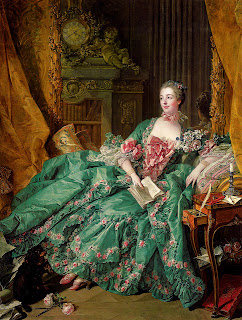These presents would consists of anything from jewels and extravagant dresses to private châteaux to downright cash.
Both the Queen consorts of Louis XIV and Louis XV lived rather withdrawn lives after their husbands attentions began to wander. Consequently, it is the expenses of the last Queen consort, Marie Antoinette, who has received the most attention. But as it turns out the Austrian-born Marie Antoinette spent far less than Louis XIV's and XV's mistresses had before her.
Madame de Montespan
Madame de Montespan has been referred to as "the real Queen of France" and was certainly treated as such during her years as Louis XIV's mistress. Montespan did not have a claim to a whole lot if you only consider her position as one of the actual Queen's ladies-in-waiting which only brought 6000 livres each year. Interestingly enough, she received a great deal of cash payments from Louis XIV rather than jewels, palaces etc.
| Madame de Montespan |
Once Madame de Montespan had begun giving birth to the King's children (7 in total) her royal lover bestowed 150.000 livres on her for their children's education and upbringing. Colbert was ordered to place 97.500 livres at her disposal in the spring of 1677. Later in 1680 when she was made a Duchess she received another cash endowment of 80.000 livres.
Like Madame de Pompadour after her Madame de Montespan owned several properties scattered across the French countryside. Two of her residences (Clagny and Glatigny) cost 405.502 livres just for the grounds while the construction of the châteaux cost 2.456.218 livres!
Up until 1707 it is estimated that Montespan received 100.000 livres each year as her revenue - at that point the treasury was basically empty.
Madame de Pompadour
Madame de Pompadour was by far one of the most expensive mistresses of the ancien regime. Upon her death it was estimated that she had spent 35.924.140 livres in her tenure from 1745-64. Today, that translates into about 470.000 pounds or 231.000.000 dollars!
Within this number lies 500.000 livres every year for perfume to be used at her Château de Choisy
Among her priced possessions were the châteaux owned by Madame de Pompadour. Her properties included the Châteaux de Pompadour, de Choisy, de la Muette, de Bellevue, de Champs, de Menars as well as the Hôtel d'Élysées and the Petit Trianon which she never saw finished.
 |
| Madame de Pompadour |
No one did more to ensure that the King was constantly entertained than Madame de Pompadour. Her most famous attribution to the Menus-Plaisirs was a small, private theatre which originally could only entertain 14 guests but was later expanded to 40. Since the essence of the maitresse-en-titre was to entertain the King most expenses were paid by this department. Therefore, we know that about 2.500.000 livres were spent each year (in comparison had the department only spent 400.000 livres under Louis XIV).
Madame du Barry
It was a tough job to take over after Madame de Pompadour but Louis XV found one last woman to lavish his affections - and presents - on. Unlike Madame de Pompadour, Madame du Barry was immensely fond of clothing and jewels.
Her wardrobe became more and more expensive with robes costing anything from 1000-10.000 livres each. Laces were a particular favourite which only added to the expense of the gowns - this raised the sum of a pair of slippers to 600 livres while an English-styled morning robe reached 4000.
The original revenue of a royal mistress was 30.000 livres which was doubled for Madame du Barry. She was also given the so-called Nantes Lodges as a New Year's Gift by the King; these lodges brought in 40.000 livres annually.
 |
| Madame du Barry |
When it came to making a good impression, it mattered little where the money came from or how much was used. The Dauphine Marie Antoinette made no show of hiding her dislike for the royal favourite which Madame du Barry desperately wanted to change. With this object in mind she offered the Dauphine a pair of earrings set with four brilliants in January 1774 at a cost of 700.000 livres - if the Dauphine chose to accept the gift du Barry (or rather the King) would pay the bill.
























































